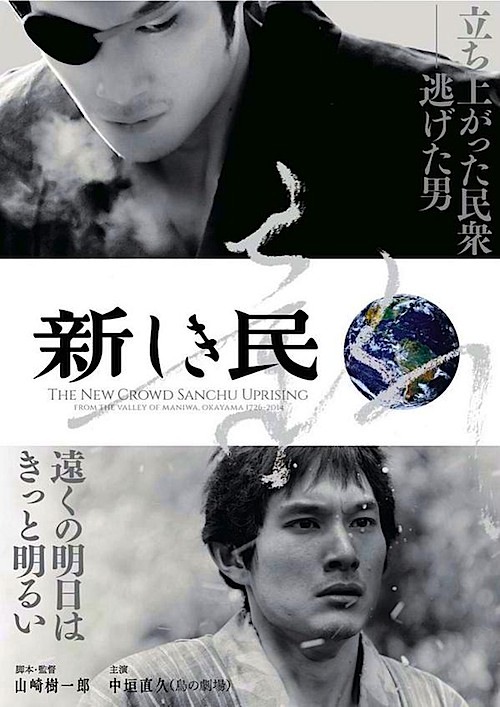By Joe Bendel. Feudalism was never any fun for the peasants. It was especially hard for the farmers, woodsmen, and iron-workers of Sanchu. They were regularly transferred from lord to lord, so each could collect his taxes within the same year. In 1726, they rose up and said enough. Unfortunately, factionalism would be their undoing. The cowardly Jihei was not much help either. It is through his unreliable eyes that viewers witness the revolt and its aftermath in Juichiro Yamasaki’s Sanchu Uprising: Voices at Dawn, which screens as the closing film of this year’s Japan Cuts, the Festival of New Japanese Film in New York.
Jihei’s brother-in-law Shinroku is probably the only member of his wife’s more well-to-do family who likes the roguish black sheep. As the various lords continue to exploit the region, Shinroku naturally expects Jihei to join the brewing rebellion. However, the not-terribly-principled Jihei has decidedly mixed feelings. Sadly, his worst instincts are stoked by the spirit of Manzo, a recent friend, who took the fall with the Shogunate authorities years ago for a dodgy scheme Jihei was running. Guilt mixed with fear will not lead to good decision-making for the sad sack Jihei.
 Shinroku and Jihei are farmers, as is the charismatic leader of the rebellion. However, the woodsmen provided the movement’s critical mass. When they are sold out at the bargaining table, Shinroku knows the samurai and nobles will be able to successfully divide and conquer.
Shinroku and Jihei are farmers, as is the charismatic leader of the rebellion. However, the woodsmen provided the movement’s critical mass. When they are sold out at the bargaining table, Shinroku knows the samurai and nobles will be able to successfully divide and conquer.
Even though it is a downer, Sanchu’s first act chronicling the ill-fated Uprising is by far the strongest. Watching the older and sadder Jihei wrestling with his angst and misgivings is not nearly as compelling. Frankly, the post-uprising sequences are over-stuffed with inconsequential encounters and meta-postscripts set in the present day. Still, there are some striking black-and-white animated interludes that give the film an unusual flavor.
Although his character is a problematic focal point, Naohisa Nakagaki shows an impressive range as Jihei. The large ensemble is wildly talented, particularly Kano Kajiwara, who is quite touching as the long-suffering Tami. However, they are often laboring against Yamasaki’s artificial stylization. Yet, that strangely seems to work in the case of Ayako Sasaki’s discordant, percussion-heavy experimental jazz score. It is certainly not the sort of music that lulls you into complacency.
Almost three hundred years after the Uprising, governments are still leveling punitive taxes on the productive classes. Indeed, during its best moments, Sanchu leads us to question just how far we have socially advanced since the feudal times. It is an uneven film, but when it connects, it hits hard. Recommended on balance for those who appreciate Jidaigeki films with a contemporary sensibility, Sanchu Uprising: Voices at Dawn screens Sunday night (7/19), at the Japan Society, as the closing film of Japan Cuts ’15.
LFM GRADE: B-
Posted on July 18th, 2015 at 9:59pm.